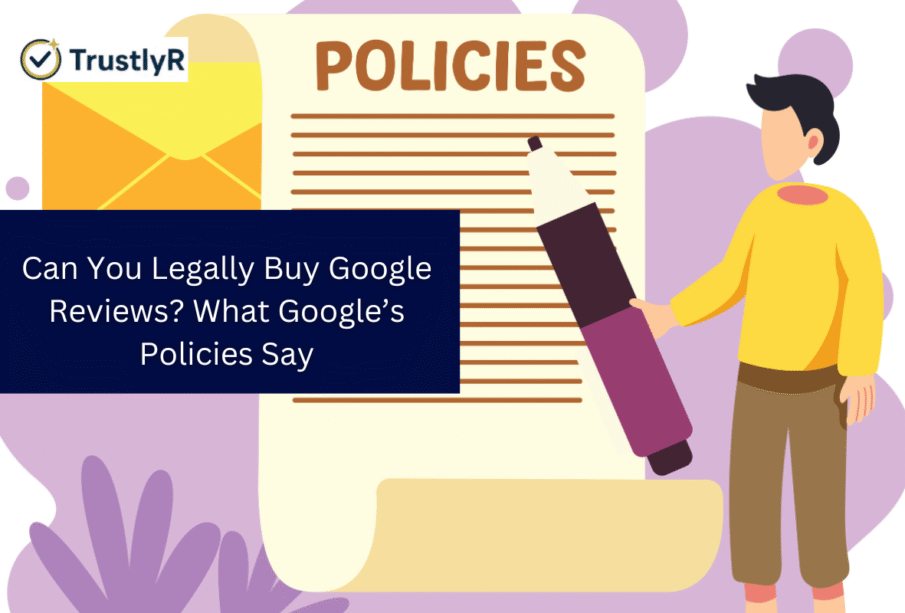Can You Legally Buy Google Reviews? What Google’s Policies Say

In today’s digital-first world, your reputation is often judged by your Google reviews. For many buyers, some companies are tempted to buy Google reviews as a shortcut to boost visibility and businesses, these ratings are the deciding factor between winning or losing customers. With competition fiercer than eredibility. At first glance, the idea seems simple: pay for positive testimonials, watch your star rating soar, and attract more clients. But is it legal to buy reviews and what does Google itself say about the practice? Let’s uncover the truth.
Motives for Companies to Invest in Google Reviews
Businesses consider buying reviews because of the pressure to stand out in crowded markets. A higher star rating instantly signals trust and can influence potential customers who are comparing multiple options. For small businesses with limited visibility, the shortcut of buying reviews may seem appealing.
However, these purchased reviews rarely reflect real customer experiences. They may provide a temporary boost in credibility, but they don’t build genuine trust. When customers sense dishonesty, it often causes more harm than having fewer reviews to begin with.
The Legal Aspects of Purchasing Reviews
Legally, buying reviews is risky. In the United States, the Federal Trade Commission (FTC) considers fake testimonials a form of deceptive advertising. Companies caught attempting to buy reviews or mislead consumers can face fines, penalties, or lawsuits.
Other countries, including the UK, Canada, and members of the European Union, have similar consumer protection laws. These regulations prohibit misleading endorsements, making it clear that businesses cannot legally purchase reviews to mislead customers.
A Look at Google’s Official Review Policy
Even if a business isn’t directly penalized by regulators, Google reviews come with their own strict rules. Google’s policies explicitly forbid the practice of paying for positive reviews or incentivizing customers in exchange for feedback. Any violation can result in reviews being removed.
For repeat offenders, Google may suspend or even delete business profiles entirely. Considering how much visibility comes from local search and Maps, losing your Google Business Profile can be devastating.
The Detrimental Effects of Purchasing Reviews on Your Business
Beyond legal and policy concerns, buying reviews damages customer trust. Fake testimonials often use vague, repetitive phrases and lack detail. Savvy customers can spot these inconsistencies quickly, and once they do, your credibility takes a serious hit.
Trust is one of the most valuable assets for a business. When customers believe you’ve manipulated reviews, they may question the quality of your products or services and that doubt can drive them to competitors.
Ethical Issues Pertaining to the Acquisition of Reviews
The ethics of buying reviews also matter. Consumers rely on Google reviews to make informed decisions. When businesses purchase fake feedback, they’re misleading customers and creating an uneven playing field for honest competitors.
This kind of deception erodes trust not only in your brand but also in the entire review system. Over time, it makes it harder for customers to distinguish between real and fake feedback, which harms everyone involved.
Genuine Google Reviews’ Value
Authentic reviews provide lasting value that purchased ones never can. Real customer experiences help potential buyers feel confident in their decisions. Even a mix of positive and critical reviews looks more trustworthy than a profile filled with suspiciously perfect ratings.
Genuine Google reviews also help with SEO. Google’s algorithm favors businesses with a steady stream of authentic feedback, boosting visibility in local search results. Authenticity doesn’t just win trust, it improves discoverability.
Less Risky Options for Purchasing Reviews
Instead of risking penalties by trying to buy Google reviews, businesses should focus on generating genuine feedback. A simple follow-up email or in-person request often goes a long way in encouraging satisfied customers to share their experiences.
Making it easy for customers to leave reviews is another powerful strategy. Adding direct review links to receipts, thank-you messages, or text reminders removes barriers and increases the likelihood of authentic testimonials.
Developing Reliability by Engaging with Customers
Customer engagement is a cornerstone of earning more Google reviews. Delivering excellent service, personalizing experiences, and addressing customer needs quickly all encourage clients to share positive feedback. Happy customers naturally become advocates for your brand.
Responding to reviews is equally important. Whether it’s a thank-you for positive feedback or a professional response to criticism, engagement shows that your business values transparency and cares about customer satisfaction.
How Trustlyr Assists in Managing Reputation
Managing reviews consistently can be challenging, which is why tools like Trustlyr exist. Trustlyr helps businesses collect, monitor, and showcase authentic customer feedback, making the process easier and more effective.
Unlike shady services that let you buy reviews, Trustlyr is built around compliance and authenticity. By using it, businesses can strengthen their reputation, avoid risks, and build credibility that stands the test of time.
Enduring Benefits of Genuine Evaluations
Choosing authenticity ensures sustainable growth. Genuine Google reviews boost conversions, strengthen customer loyalty, and improve SEO rankings over time. Unlike purchased reviews, they can’t be flagged or deleted for violating policies.
Authentic feedback also offers helpful observations about customer needs. Positive comments highlight what you’re doing right, while constructive criticism identifies areas for improvement. Both help you grow stronger in the long run.
Conclusion
So, can you legally buy Google reviews? In most cases, the answer is no. Both the law and Google’s policies stress that purchasing fake feedback is prohibited. Beyond the legal risks, the practice undermines customer trust and can permanently damage your reputation.
Instead, focus on authenticity. Encourage genuine feedback, engage with your customers, and use tools like Trustlyr to manage your online reputation the right way. In the digital marketplace, trust is everything and there’s no shortcut to earning it.











